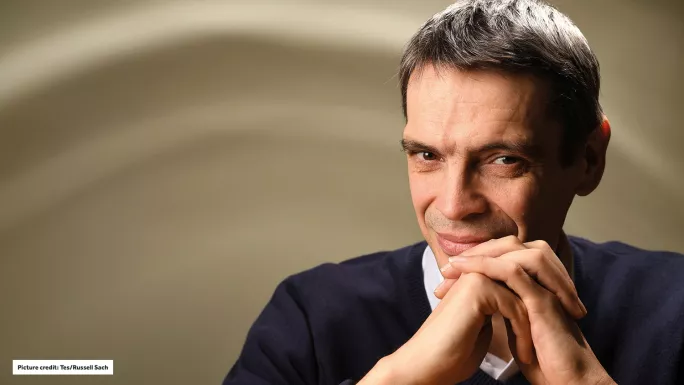Charlie Stripp profile: ‘Maths teachers sometimes sort of apologise for their subject. Don’t do that. Maths is great’

Charlie Stripp, the genial chief of two national maths organisations, has the job of coming up with ways to make us all love maths - or at least do better at it.
So when he thinks back to his first teaching job, and being faced with a set of sullen Year 9s, how exactly did he manage that?
“I’m very enthusiastic about maths,” he explains. “I really enjoy it and I think that kind of rubs off, to some extent…Maths teachers sometimes sort of apologise for their subject. Don’t do that. Maths is great.”
Stripp, 52, is now chief executive of Mathematics in Education and Industry (MEI) and director of the National Centre for Excellence in the Teaching of Mathematics (NCETM), which is partly managed by MEI. But teaching wasn’t his first choice of career.
His current vocation was sparked during three tumultuous years in his 20s - a time when Stripp survived a near-fatal accident, which prompted him to reflect on a change of career.
He had begun his working life training as an accountant in Cornwall. Then, just a few months in, he was involved in a motorbike accident in which he fractured his skull, broke his neck and ruptured his spleen. Three months later, Stripp returned to work. But, as he approached his final professional exams, he contracted glandular fever and had to defer for six months.
That was when he admitted to his father that he wasn’t really keen on accountancy after all. His dad advised Stripp not to take the final exams, saying if he did, he would be “stuck” in an unwanted career path.
So, instead, Stripp left the accountancy firm, applied to become a teacher and took up a PGCE place at the University of Exeter, training to teach maths and outdoor education.
“Having something as major as that accident makes you look at things differently,” he recalls. “You become less inclined to drift along and think things will work out. You think, what is it I want to do?
“I really believe in the power of education. Maths is a great leveller as well. If you can do maths, it doesn’t matter if you have Radio 4-listening parents or not. If you’re prepared to be interested in maths and the right support is there, then it’s a great way of really making progress and developing an ability that is going to be very useful for you in life.”
Stripp enjoyed his school days. He grew up in a village near East Grinstead, West Sussex. His dad did various jobs, including working as a TV repair man, driving an undertaker’s hearse and running his own grocery shop. His mother also worked in their shop.
At nearby Imberhorne Comprehensive, Stripp took A levels in maths, physics and chemistry, and was seen as Oxbridge material. This meant that the headteacher set him extra reading and essays to write every week, covering classics such as Plato’s Republic.
But while Stripp was awarded a distinction in his special paper for physics, he didn’t secure an Oxbridge place.
Instead, he attended the University of Nottingham, where he read mathematical physics and got into rock climbing - an interest that, after graduation, took him to Cornwall and its coastal cliffs. He still lives in the West Country today with his wife, Samantha, who he met in a Falmouth nightclub, and their two teenage children.
‘Teaching isn’t boring’
Stripp’s first job as a maths teacher at Colyton Grammar, Devon, landed him in the lucky position of having the support of a maths department with a team mindset. He found teaching to be demanding, but worthwhile. “Whatever teaching is, it’s not boring,” he laughs.
But it was his first experience of teaching A-level further maths, after moving to Exeter College, that stands out as a key point is his development as a maths educator. “I remember I was very keen,” he says. “I wanted to teach further maths, but some of the first maths I was teaching was maths that I hadn’t personally done before, so I had to learn it.”
Stripp buckled down to mastering decision maths, critical-path analysis and statistics, and found that taking a student-eye view helped his teaching.
“I don’t think I’ve ever taught better than when I was in that situation - preparing all this stuff and learning it from scratch,” he says. “I think part of the reason for that was because [it brought me closer to] the experience the students had.”
Further maths also played a key role in a big move seven years later when MEI secured funding from the Gatsby Foundation to help boost take-up in the subject, and needed someone to run the pilot project. Stripp was given the job.
Roger Porkess was the chief executive of MEI at the time and praises Stripp’s “vision and determination”.
“It was a tough task,” he recalls.
“The conventional wisdom in the late 1990s was that further mathematics was dead in the water; the number of students taking it had fallen drastically.”
Online materials had to be produced to support sparsely scattered students; schools needed to be brought together to share teaching; and admissions tutors had to be convinced of the subject’s value.

“Charlie found ways to overcome all of these challenges, and many more,” says Porkess. In 2000, the number of entries for A-level further maths stood at about 4,400; by 2015, more than 15,000 students were entering the exam.
In 2010, when Porkess retired, Stripp became chief executive of MEI. And three years later, he took on the part-time role of director of NCETM, where he expanded his knowledge of primary education.
But he has always remembered the lessons he learnt during his early career and it was Exeter College that he returned to recently to get a real understanding of the impact of the most controversial current maths policy: requiring all students who got a grade D or grade 3 GCSE to resit.
Stripp decided to teach GCSE maths resit students himself in 2015-16. He shared a class with another teacher, each taking the students for one-and-a-half hours per week. “I wanted to understand where those students were, how they might have a good experience and how they could be successful,” he says.
“Most had got a D, but what I found was they didn’t understand quite fundamental things, like place value. They were not stupid - they had not been successful at maths. And they had had a bad experience of maths.”
His class did slightly better than the national average, but he recalls one student who Stripp felt was going to pass - but then didn’t turn up for the exam, perhaps not having the confidence to face the GCSE paper yet again.
Proposed new qualification
The government recently announced that £8.5 million will be spent on a pilot exploring “innovative approaches” to improving resit outcomes. But Stripp has another idea: a new post-16 maths GCSE created for this group of people. This would have a smaller amount of (relevant) content than the standard GCSE and perhaps be only available as a foundation-tier qualification. MEI, he says, would be glad to work on developing this.
“Something I really worry about with maths is that it is the subject, more than any other subject, that is about passing the exam,” he says. “And actually that’s not the reason you do maths at all, but our whole culture about league tables has made that happen.”
Stripp does not think that there is any point in blaming primary, secondary or further education teachers for current resit outcomes. The point is that the system is set up in the way that it is. But it doesn’t have to be.
The idea that maths is not just a subject for “maths people”, but a skill for all, is becoming more widespread, says Stripp, especially since the advent of primary school teaching for mastery. He is not blithely optimistic and recognises the “massive disparity” in educational opportunities across the country. But he believes the challenge of encouraging everyone to see themselves as able at maths - and to enjoy maths - is worthwhile.
“I got involved because I think maths education is so important,” he says. “It has such an impact on people’s lives. So we need to make it fairer, so everyone can access a really good maths education.”
You need a Tes subscription to read this article
Subscribe now to read this article and get other subscriber-only content:
- Unlimited access to all Tes magazine content
- Exclusive subscriber-only stories
- Award-winning email newsletters
Already a subscriber? Log in
You need a subscription to read this article
Subscribe now to read this article and get other subscriber-only content, including:
- Unlimited access to all Tes magazine content
- Exclusive subscriber-only stories
- Award-winning email newsletters